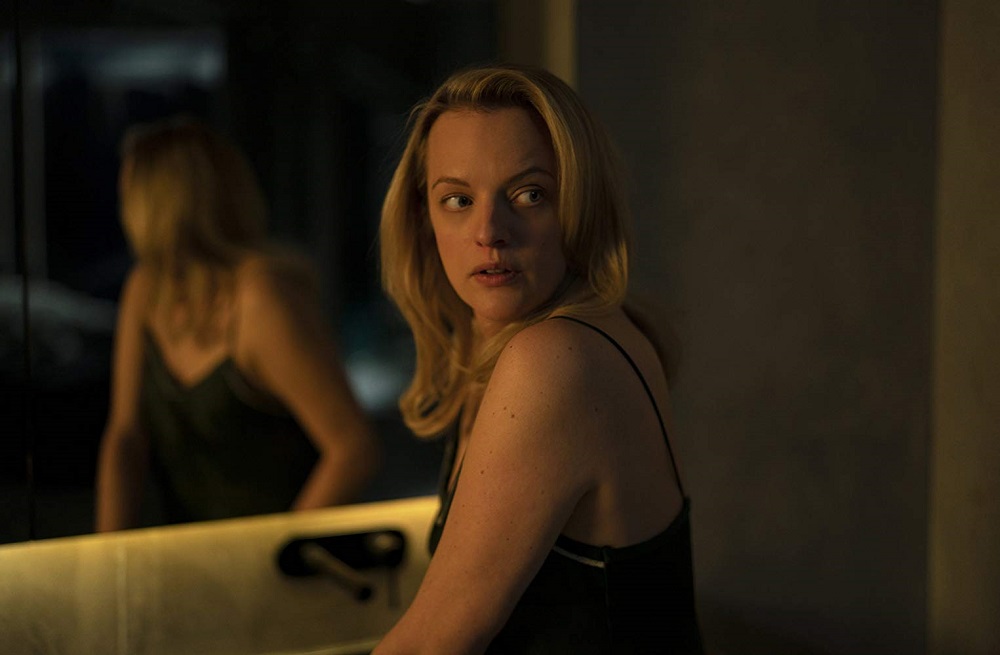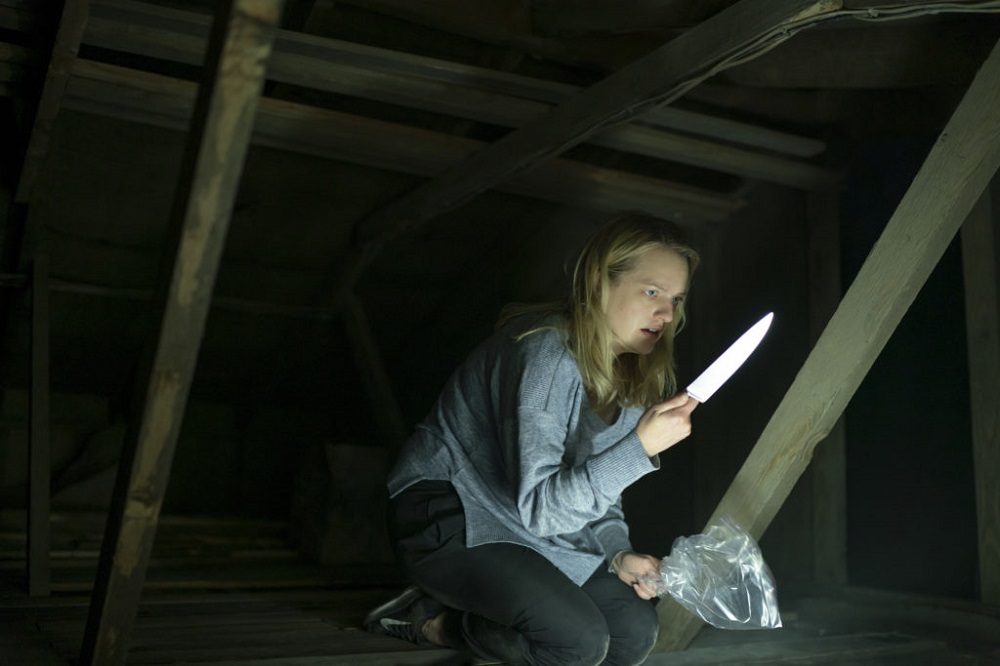Right off the bat, I can say that this is my kind of remake.
With the Dark Universe quickly turned to dust thanks to the financial demise of The Mummy, Universal turned to successful horror producer Jason Blum and co to reboot their planned reboot of one of H.G. Wells’ most iconic creations. The Invisible Man could’ve been a very cut-and-dry movie, but as is the case with Blumhouse’s other current offering, Fantasy Island, the decision was made to make a high-concept horror re-imagining that, for the most part, succeeds in supplying some serious suspense.

Cecilia Kass (played by The Handmaid’s Tale’s Elizabeth Moss) has successfully escaped the clutches of her technological savant and control freak of a husband, Adrian (Oliver Jackson-Cohen). Taking refuge with her sister Alice (Harriet Dyer), her close friend James (Aldis Hodge) and his daughter Sydney (Storm Reid), Cecilia breathes a sigh of relief when Adrian winds up dead, having taken his own life. But the paranoia only gets worse from there. She keeps hearing footsteps throughout the house. Objects are moving when her back is turned. Approaching the brink of insanity, Cecilia works to convince the people around her that there is an invisible man amongst them.

Director Leigh Whannell has a real challenge before him. Gone are the gimmicks of the Saw movies or the twisted storytelling of the Insidious franchise, both of which he helped to originally write/create. Here is a premise that cannot be propelled by cliched jump scares or torture-porn gory dismemberment alone. In order to tell a good story and truly scare your audience, you must construct an environment and atmosphere that can evoke fear using the absence of anything. Whannell clearly knows how to do that. A great number of the shots are in wide-frame, pan-and-scan is used to survey a supposedly empty area, and single-takes accelerate scenes which may seem to yield little action, but are successful in getting one’s heart racing.
There are some dud scenes scattered throughout the first half of the film though. While they pay dividends later to help build that all-important tension, they can be viewed in the moment as rather pointless as they seemingly linger for too long to no effect. However, what saves you from fading out in these beats are the peripheral storytelling elements, specifically the excellent use of music and musical cues. Whannell keeps most of the background silent sans a handful of dramatic upswellings from Benjamin Wallfisch’s score which is used perfectly. When it plays, it makes a real entrance and creates a fine contrast with the rest of the film’s quietude.

Elizabeth Moss also has a very tough job with this film. There are only so many definitive actions that can help reinforce the notion that an invisible man is in the room and he’s out to get you. She has to work hard on portraying that eviscerating paranoia and a fear of something that nobody can actually see. It is through her responses that we get the gravity of the scene and she does an excellent job with that. What I especially love about this performance, and it’s something that Whannell’s screenplay needs to be given top props for, is that there is no reliance on monologues. Only once or twice will she talk to an empty room. The rest of the time it’s just her facial expressions and movements which are doing the job. The acting from the rest of the cast is all good too, but the excellent Moss really stands out.
Speaking of that screenplay, H.G. Well’s original premise is only here in spirit (ha). The dramatic escapades involving a scientific experiment gone haywire have not survived the Blumhouse treatment. Instead, this new rendition strips away most of the sci-fi trappings to focus more on the much more grounded horror of people hurting other people. Without getting into spoilers, I see this film suffering the same criticisms from certain fans as levelled at the 2019 remake of Child’s Play in regards to the barebones nature of its plot. The Invisible Man’s plot may also be simplistic, but what saves it is the use of highly effective suspense and strong characterization making it a thrilling watch.

This is not H.G. Well’s Invisible Man. This is not even Universal’s 1933 classic version of the Invisible Man. This is Elizabeth Moss having to deal with her dangerous past no longer being metaphorical and in the room messing with her. I was on board from start to finish and I salute all parties involved for trying something different and succeeding.
Last Updated: February 24, 2020
| The Invisible Man | |
|
Apart from a few moments that feel like they amount to nothing, The Invisible Man is a polished and utterly suspenseful reimagining of Universal's classic horror icon. With an ambitious performance from its lead actress and insightful writing/directing choices, this is a remake done right.
|
/10
|
|---|---|
|
| |




















Hammersteyn
February 24, 2020 at 13:01
https://youtu.be/zKdxd718WXg
Tbone187
March 2, 2020 at 13:34
So the man becomes invisible and the best he can do is haunt his ex? Yurra!
HvR
March 2, 2020 at 15:23
You know needs to tie in with current social agenda of toxic masculinity and gaslighting.
Son of Banana Jim
March 2, 2020 at 16:14
Yurra, indeed! That’s the sort of “quality” Hollywood writing we get in the year of our lord, 2020…